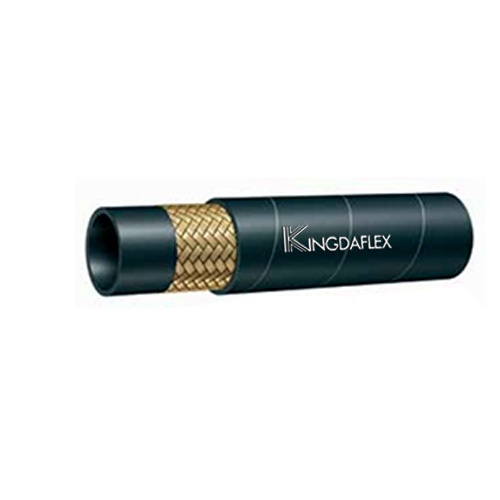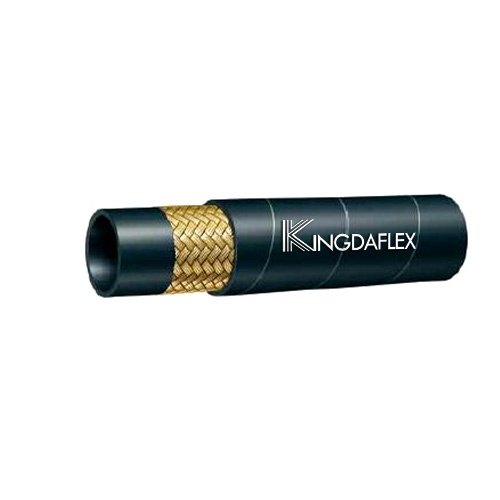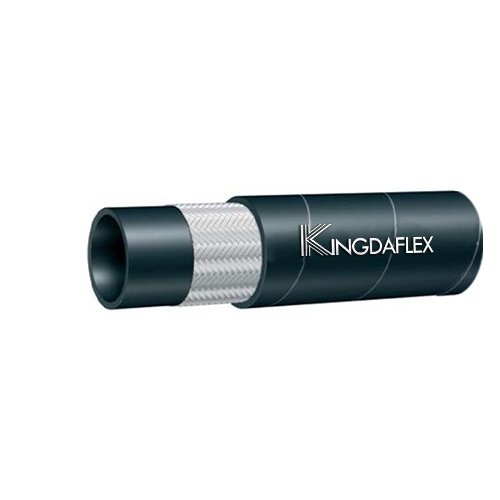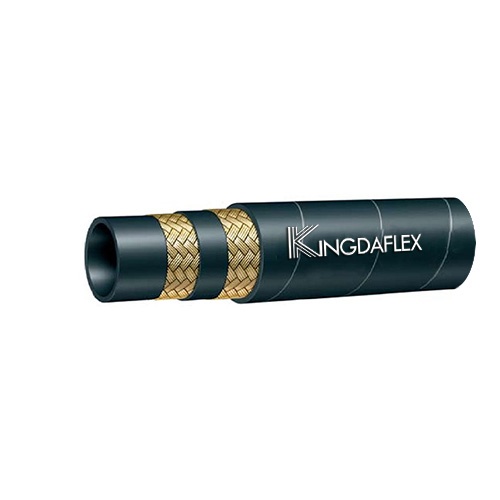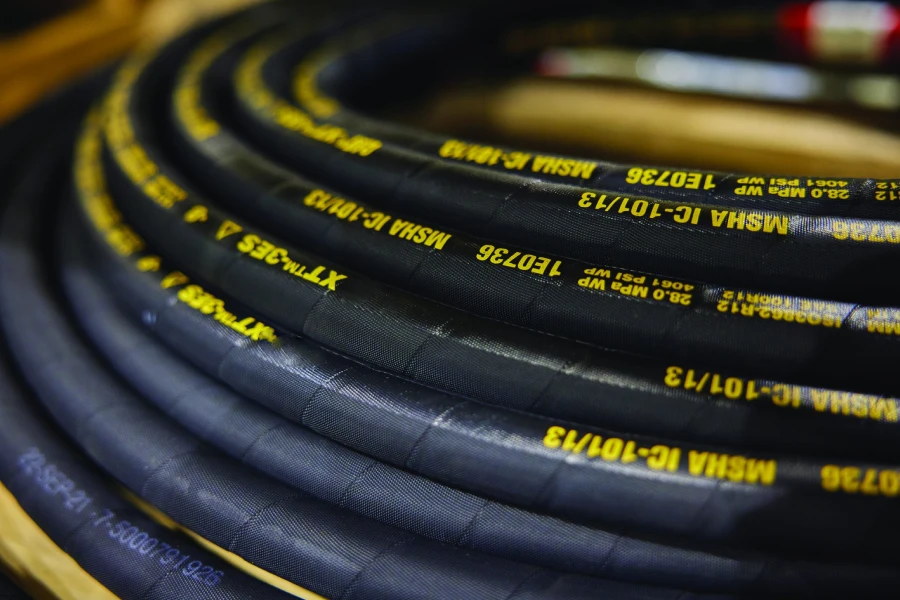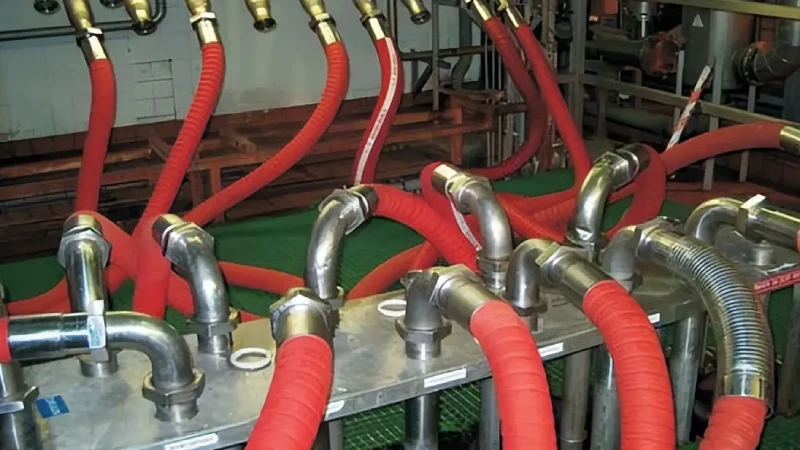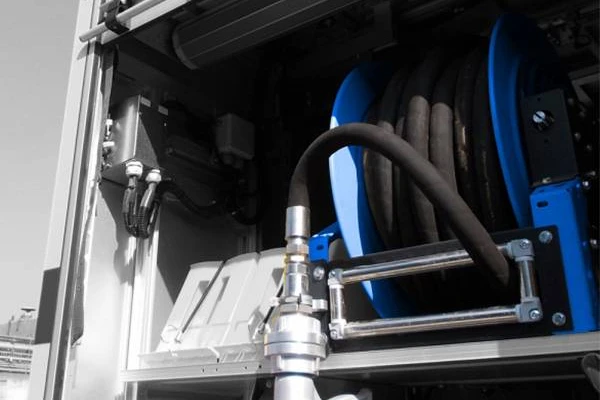Hydraulic systems are the backbone of countless industrial and mechanical applications. At the heart of these systems lie hydraulic hoses, which are responsible for transporting high-pressure fluid. Two common types of hydraulic hoses are 1-wire and 2-wire hoses. While they may look similar, they differ significantly in their construction and capabilities.
In this blog post, we will delve into the key differences between 1-wire and 2-wire hydraulic hoses, explore their advantages and disadvantages, and help you determine the best choice for your specific application.
What Is 1 Wire Hydraulic Hose
A 1-wire hydraulic hose is a type of hydraulic hose that is reinforced with a single layer of steel wire braid. This construction makes it more flexible and lightweight compared to 2-wire hoses. However, it also means that 1-wire hoses have a lower pressure rating and are less durable than 2-wire hoses.
Key features of 1-wire hydraulic hoses:
- Single layer of steel wire braid reinforcement: This provides good flexibility but lower pressure resistance.
- Lower pressure rating: Typically rated for pressures up to 3,250 PSI.
- More flexible: Easier to route and install in tight spaces.
- Lighter weight: Reduces the overall weight of the hydraulic system.
- Lower cost: Generally more affordable than 2-wire hoses.
Applications:
1-wire hydraulic hoses are suitable for a variety of applications where lower pressure and flexibility are prioritized. Some common applications include:
- Agricultural machinery
- Construction equipment
- Mobile hydraulic systems
- Industrial machinery
When to use 1-wire hydraulic hoses:
- When the application requires a flexible hose.
- When the pressure requirements are moderate.
- When cost is a significant factor.
Important considerations:
- Pressure rating: Ensure the hose’s pressure rating is sufficient for your application.
- Temperature range: Consider the temperature extremes in your operating environment.
- Fluid compatibility: Verify that the hose is compatible with the hydraulic fluid you’re using.
- Hose length and diameter: Choose the appropriate length and diameter to meet your specific needs.
- Fittings: Select compatible fittings to ensure a secure and leak-free connection.
By carefully considering these factors, you can select the right 1-wire hydraulic hose to optimize your hydraulic system’s performance and reliability.
What Is 2 Wire Hydraulic Hose
2-wire hydraulic hoses are a type of hose used in hydraulic systems to transport high-pressure fluids. They are characterized by their robust construction and ability to handle demanding conditions.
Key features of 2-wire hydraulic hoses:
- Reinforcement: They have two layers of steel wire braid that provide superior strength and durability.
- Pressure Rating: They are typically rated for higher pressures than 1-wire hoses, often up to 4,000 PSI or more.
- Temperature Range: They can withstand a wider range of temperatures, from -40°F to +212°F or even higher.
- Flexibility: While less flexible than 1-wire hoses, they still offer good flexibility for various applications.
- Applications: 2-wire hydraulic hoses are used in a variety of applications, including construction equipment, agricultural machinery, industrial machinery, and mobile hydraulic systems.
Advantages of 2-wire hydraulic hoses:
- Reliable Performance: The robust construction and high-pressure rating ensure reliable performance in demanding conditions.
- Durability: The weather-resistant and abrasion-resistant outer cover prolongs the hose’s lifespan.
- Versatility: Suitable for a wide range of applications due to their flexibility and pressure rating.
- Cost-Effective: The long lifespan and durability reduce the need for frequent replacements, saving costs in the long run.
When choosing a 2-wire hydraulic hose, consider the following factors:
- Pressure Rating: Ensure the hose’s pressure rating is sufficient for your application.
- Temperature Range: Select a hose that can withstand the temperature extremes in your operating environment.
- Fluid Compatibility: Verify that the hose is compatible with the hydraulic fluid you’re using.
- Hose Length and Diameter: Choose the appropriate length and diameter to meet your specific needs.
- Fittings: Select compatible fittings to ensure a secure and leak-free connection.
By carefully considering these factors, you can select the right 2-wire hydraulic hose to optimize your hydraulic system’s performance and reliability.
1 Wire vs 2 Wire Hydraulic Hose
Choosing between 1-wire and 2-wire hydraulic hoses is crucial for optimizing hydraulic system performance and safety. While both are designed to transfer fluid under pressure, their internal construction dictates their capabilities, suitable applications, and overall cost-effectiveness, making the right selection vital for your machinery.
Reinforcement Layers
A 1-wire hydraulic hose features a single layer of high-tensile steel wire braid directly over its inner tube. This solitary reinforcement provides robust strength for medium-pressure applications, offering a balance of performance and flexibility.
In contrast, a 2-wire hydraulic hose incorporates two distinct layers of high-tensile steel wire braid, typically separated by an intermediate rubber layer. This double reinforcement significantly boosts the hose’s structural integrity.
Pressure Capability
Due to its single layer of reinforcement, a 1-wire hydraulic hose is generally rated for medium-pressure hydraulic systems. It is well-suited for applications where consistent but not extreme pressure is maintained.
The dual wire braids of a 2-wire hydraulic hose allow it to safely handle significantly higher operating pressures. This makes it the preferred choice for heavy-duty machinery and high-force applications.
Flexibility
1-wire hydraulic hoses typically offer greater flexibility compared to their 2-wire counterparts. Their less rigid construction allows for tighter bend radii, making them easier to route in confined spaces and simplifying installation.
Conversely, 2-wire hydraulic hoses are inherently stiffer due to the additional reinforcement layers. While they provide superior strength, this rigidity can limit their bend radius and make them more challenging to install.
Applications
1-wire hoses are commonly found in a wide array of medium-pressure applications, including agricultural machinery, light construction equipment, and general industrial hydraulics. Their balance of strength and flexibility makes them versatile.
2-wire hoses are indispensable in heavy-duty applications where high pressure and ruggedness are paramount. This includes large construction excavators, mining equipment, and high-performance industrial hydraulic systems.
Cost
Generally, 1-wire hydraulic hoses are more cost-effective per foot to manufacture and purchase. Their simpler construction requires less raw material and a less complex braiding process, making them an economical choice.
2-wire hydraulic hoses, with their additional reinforcement layers and more involved manufacturing process, are typically more expensive. The higher cost reflects their superior pressure handling capabilities and durability.
Weight and Outer Diameter
1-wire hydraulic hoses are lighter and have a smaller outer diameter compared to 2-wire hoses of the same internal diameter. This can be beneficial where weight reduction is desired or space is very compact.
The extra wire braid and rubber layer in 2-wire hoses contribute to a greater overall weight and a larger outer diameter. This added bulk is a trade-off for increased pressure rating.
1 Wire vs 2 Wire Hydraulic Hose
| Feature | 1 Wire Hydraulic Hose | 2 Wire Hydraulic Hose |
| Reinforcement | Single layer of steel wire braid | Two layers of steel wire braid |
| Pressure Cap. | Medium pressure | High pressure |
| Flexibility | More flexible, tighter bend radius | Less flexible, larger bend radius |
| Applications | Agricultural, light construction, general industrial | Heavy construction, mining, high-performance industrial |
| Cost | More cost-effective | Higher cost |
| Weight/OD | Lighter, smaller outer diameter | Heavier, larger outer diameter |
Single Braid vs Double Braided Hose
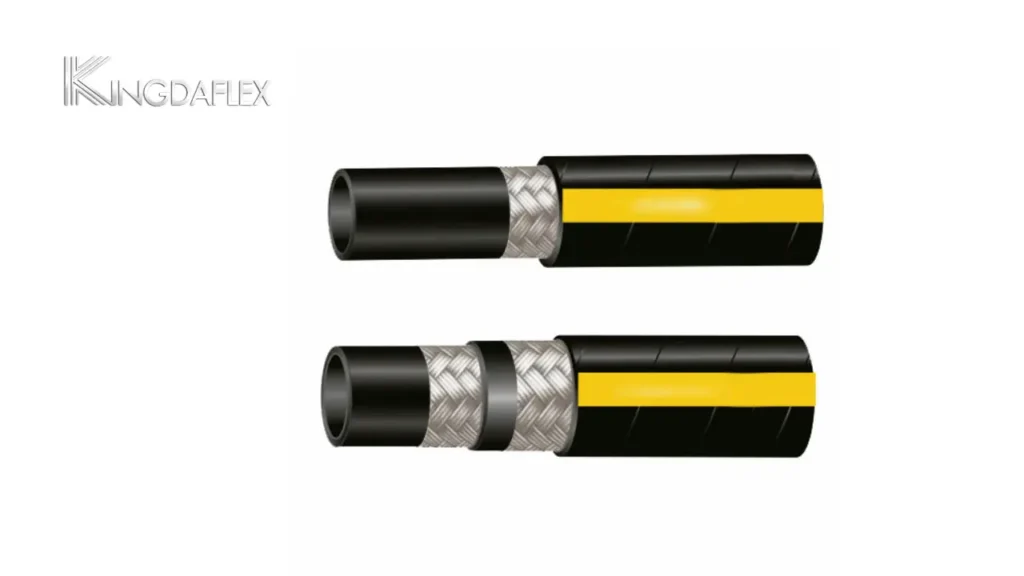
Choosing between single braid and double braided hydraulic hoses is crucial for optimizing hydraulic system performance and safety. While both are designed to transfer fluid under pressure, their internal construction dictates their capabilities, suitable applications, and overall cost-effectiveness, making the right selection vital for your machinery.
Reinforcement Layers
A single braid hydraulic hose features one layer of high-tensile steel wire braid directly over its inner tube. This solitary reinforcement provides robust strength for medium-pressure applications, offering a balance of performance and flexibility.
In contrast, a double braided hydraulic hose incorporates two distinct layers of high-tensile steel wire braid, typically separated by an intermediate rubber layer. This double reinforcement significantly boosts the hose’s structural integrity.
Pressure Capability
Due to its single layer of reinforcement, a single braid hydraulic hose is generally rated for medium-pressure hydraulic systems. It is well-suited for applications where consistent but not extreme pressure is maintained.
The dual wire braids of a double braided hydraulic hose allow it to safely handle significantly higher operating pressures. This makes it the preferred choice for heavy-duty machinery and high-force applications.
Flexibility
Single braid hydraulic hoses typically offer greater flexibility compared to their double braided counterparts. Their less rigid construction allows for tighter bend radii, making them easier to route in confined spaces and simplifying installation.
Conversely, double braided hydraulic hoses are inherently stiffer due to the additional reinforcement layers. While they provide superior strength, this rigidity can limit their bend radius and make them more challenging to install.
Applications
Single braid hoses are commonly found in a wide array of medium-pressure applications, including agricultural machinery, light construction equipment, and general industrial hydraulics. Their balance of strength and flexibility makes them versatile.
Double braided hoses are indispensable in heavy-duty applications where high pressure and ruggedness are paramount. This includes large construction excavators, mining equipment, and high-performance industrial hydraulic systems.
Cost
Generally, single braid hydraulic hoses are more cost-effective per foot to manufacture and purchase. Their simpler construction requires less raw material and a less complex braiding process, making them an economical choice.
Double braided hydraulic hoses, with their additional reinforcement layers and more involved manufacturing process, are typically more expensive. The higher cost reflects their superior pressure handling capabilities and durability.
Weight and Outer Diameter
Single braid hydraulic hoses are lighter and have a smaller outer diameter compared to double braided hoses of the same internal diameter. This can be beneficial where weight reduction is desired or space is very compact.
The extra wire braid and rubber layer in double braided hoses contribute to a greater overall weight and a larger outer diameter. This added bulk is a trade-off for increased pressure rating.
Single Braid vs Double Braided Hose
| Feature | Single Braid Hydraulic Hose | Double Braided Hydraulic Hose |
| Reinforcement | Single layer of steel wire braid | Two layers of steel wire braid |
| Pressure Cap. | Medium pressure | High pressure |
| Flexibility | More flexible, tighter bend radius | Less flexible, larger bend radius |
| Applications | Agricultural, light construction, industrial | Heavy construction, mining, high-performance |
| Cost | More cost-effective | Higher cost |
| Weight/OD | Lighter, smaller outer diameter | Heavier, larger outer diameter |
Conclusion
In conclusion, understanding the distinctions between 1-wire and 2-wire hydraulic hoses is essential for making informed decisions in various industrial and mechanical applications. While 1-wire hoses offer flexibility and cost-effectiveness, 2-wire hoses provide superior performance in terms of pressure, durability, and temperature resistance.
By carefully considering factors such as pressure requirements, temperature range, flexibility, and cost, you can select the optimal hose for your specific needs.
Ready to customize your ideal hydraulic hose?
Kingdaflex offers a wide range of high-quality hydraulic hoses tailored to meet your unique requirements. Our experienced team can help you choose the perfect hose for your application.
Contact us today to discuss your needs and get a customized solution.

